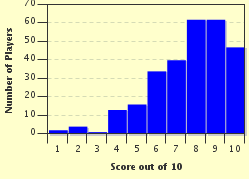Quiz Answer Key and Fun Facts
1. "Under the Harvest Moon" was written by Carl Sandburg in 1916. In which season of the year is the poem set?
2. "Music, When Soft Voices Die" was written by the same English poet who gave the world "To A Skylark". Who was that poet?
3. This lovely work was written as a poem which was then applied to the music of an old traditional and very beautiful Irish folk melody. Can you complete the two words missing from its title?
"Believe Me, if All Those Endearing... ..."
4. Which English Romantic poet, who wrote "Lyrical Ballads" with Samuel Taylor Coleridge, wrote the beautiful 1798 poem which begins with the lines "She dwelt among the untrodden ways"?
5. "The Lover Mourns for the Loss of Love" was written by a famous Irish poet who was obsessed with the elusive Maud Gonne for most of his life. Who was he?
6. The beautiful poem "A Dream Within A Dream" was written by the American poet who also wrote the 1845 poem "The Raven". Who is he?
7. One of the most misunderstood poems ever written perhaps is "The Road Not Taken". Which great American poet wrote this work?
8. An extremely prolific American poet wrote the lovely short poem often referred to by its first line, "I Held a Jewel in My Fingers", in 1861. What was her name?
9. Can you supply the missing word(s) in this very evocative poem by Edna St. Vincent Millay?
"Only until this _____ is ended"
10. The beautiful poem "Funeral Blues" by W. H. Auden was also known by another well known name. Which name was this?
Source: Author
Creedy
This quiz was reviewed by FunTrivia editor
agony before going online.
Any errors found in FunTrivia content are routinely corrected through our feedback system.

